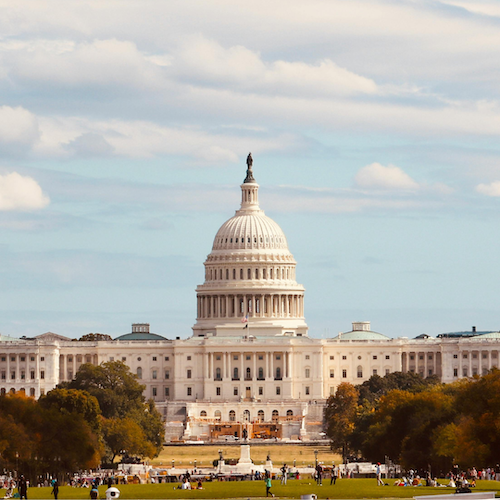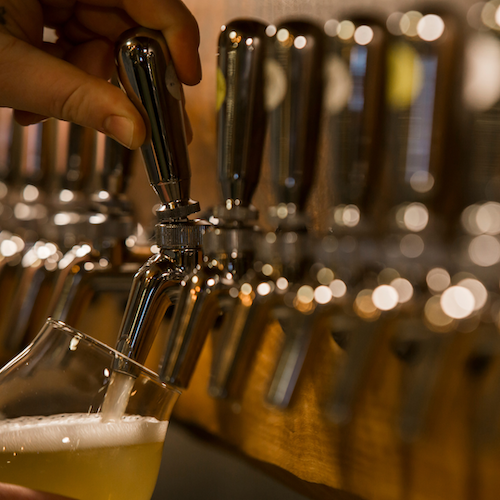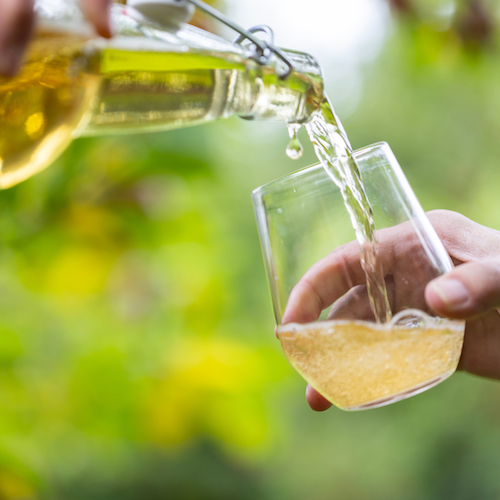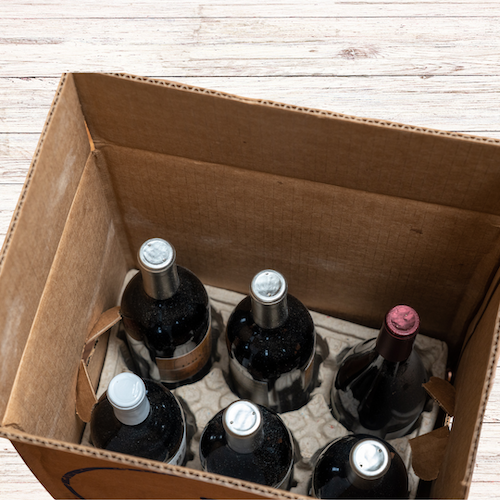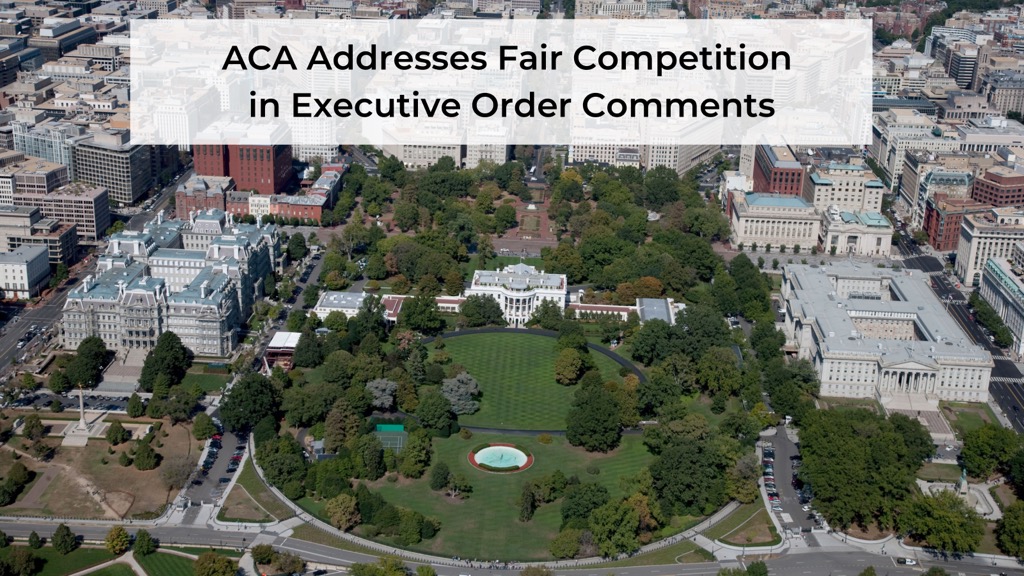Legislation
New Dietary Guidelines Reinforce a Science-Based, Moderate Approach to Alcohol
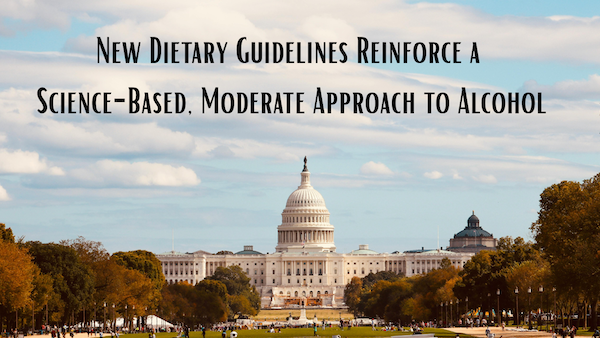
The newly released U.S. Dietary Guidelines for Americans reaffirm a long-standing, evidence-based approach to alcohol consumption—one grounded in moderation and informed by the full body of peer-reviewed research. For the American Cider Association and our members, this outcome reflects the importance of keeping science, not bias, at the center of federal health policy.
Throughout the Guidelines development process, ACA worked alongside the Science Over Bias coalition, a group of beverage alchohol associations and additional stakeholders committed to transparency and scientific integrity. The coalition formed in response to proposals that would have dramatically lowered recommended alcohol limits based on selective research, advancing a “no consumption is best” approach. Ultimately, the final Guidelines maintained moderation standards that reflect decades of scientific consensus and real-world context.
The official DGA alcohol recommendation:
- Consume less alcohol for better overall health.
- People who should completely avoid alcohol include pregnant women, people who are recovering from alcohol use disorder or are unable to control the Sodium amount they drink, and people taking medications or with medical conditions that can interact with alcohol. For those with a family history of alcoholism, be mindful of alcohol consumption and associated addictive behaviors.
This change removes the previous daily guidance of up to one beverage for women and two beverages for men, shifting away from gender-specific intake recommendations.
This broad coalition of the nation’s agriculture, beverage and hospitality industries issued the following statement in response to the alcohol guidance in the new Dietary Guidelines for Americans:
“The Dietary Guidelines’ longstanding, overarching advice is that if alcohol is consumed, it should be done in moderation. These updated guidelines, underpinned by the preponderance of scientific evidence, reaffirm this important guidance.”
For cidermakers, this matters. Cider is an agricultural product rooted in orchards, rural economies, and small businesses—many of them family-owned and women-led. Federal nutrition guidance has real implications for how our industry is perceived, regulated, and communicated to consumers. Balanced, evidence-based policy allows producers to continue promoting responsible consumption while supporting local agriculture and hospitality.
ACA supports clear consumer education, transparency, and ongoing research into alcohol and health. At the same time, we believe that public policy must consider the totality of evidence and the diverse communities affected by it—from farmers and producers to consumers and public health professionals.
We appreciate the work of the many scientists, advocates, and coalition partners who spoke up during this process. The ACA will continue engaging with Congress, federal agencies, and allied organizations to ensure that future alcohol policy discussions remain fair, data-driven, and free from predetermined outcomes.
More resources about the Dietary Guidelines for Americans:
The Shutdown’s Nearing an End. Now What?

After weeks of uncertainty, the federal government is (almost) finally back in business and that means the TTB and other key agencies are, too. For cideries, this is the moment to shake off the disruption, check in on delayed approvals, and get your product plans back on track.
The American Cider Association (ACA) has continued to stay in touch with Hill offices throughout the shutdown to make sure the voice of cider was still being heard. Now that things are moving again, offices are far less distracted and listening. Which means this is the time for cidermakers across the country to speak up and make sure Congress understands how federal policy impacts your business and your growers.
Here are a few steps to help you get back up to speed—and plug into the national cider conversation while it matters most:
Now is the Time to Use Your Voice
Lawmakers are turning their attention to appropriations before the end of the year, and now is when your voice has the most impact.
We’re calling on everyone in the cider community to join our Do Gooder campaign and send a quick message to your Congressional representative about the Bubble Bill—a key piece of legislation that supports small producers and the farmers they work with. It takes less than a minute – click the link, enter your address, press send.
Do Gooder Link to Email Your Reps
A personal note from a constituent cidermaker goes further than you might think. Even just a handful of messages can help move the needle and keep cider in the conversation on Capitol Hill. If you’re a cider lover rather than a cidermaker, your voice can help elevate the message from the cideries you love.
Check on Your TTB Filings
With the TTB reopening, the agency is now working through its backlog of label and formula approvals. If you have pending applications, log in and confirm their status.
If anything was returned or expired during the shutdown, resubmit as soon as possible and prioritize what’s most urgent for your production schedule.
Reassess Your Production and Release Schedule
A temporary freeze can throw even the best-laid plans off course. Take a fresh look at your seasonal releases, packaging timelines, and distributor communication. If your new ciders were caught in the delay, use this moment to reimagine your launch strategy. Perhaps pair a release with a taproom event or local collaboration to generate excitement?
Stay Visible in Your Community:
Your customers are always ready to support you. Host a cider release, organize a small tasting, or simply share what’s new at your cidery. Keeping your story front and center helps the public, and policymakers, understand the role cider plays in local economies and agriculture.
Government Affairs Update: ACA Lauds the CHEERS Act to Support Bars, Restaurants and Venues with Draft Systems
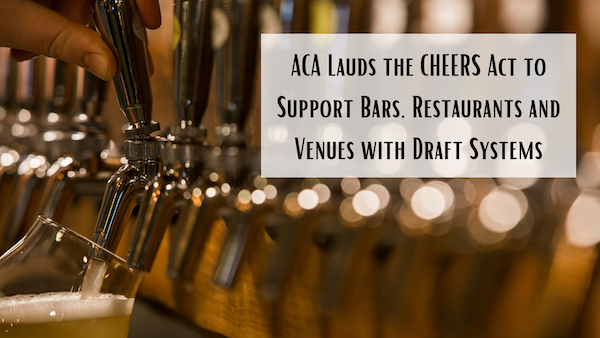
On March 11, U.S. Representatives Darin LaHood (R-IL-16) and Steven Horsford (D-NV-04) introduced the Creating Hospitality Economic Enhancement for Restaurants and Servers Act (CHEERS Act), a bipartisan effort aimed at supporting local businesses, restaurants, and bars with a focus on draft beverage systems. This legislation seeks to revitalize the hospitality industry by expanding tax incentives for investments in energy-efficient systems that include keg and tap property.
The American Cider Association has joined the Beer Institute, the Brewer’s Association, National Beer Wholesalers Association, the National Restaurant Association, the Independent Restaurant Coalition and others in applauding this effort. By offering support for the use of draft lines and keg equipment in establishments, the CHEERS Act recognizes the importance of draft beverages and their connection to a thriving hospitality sector.
Michelle McGrath, CEO of the American Cider Association, highlighted the significance of draft cider sales in the Beer Institute’s press release about the bill on March 11, stating that draft cider accounts for 60% of hard cider consumption at establishments.
“On-premise consumption plays a crucial role in introducing consumers to cider, making restaurants, pubs, taprooms, sports arenas, bars, and movie theaters vital components of the commercial cider ecosystem,” McGrath stated.
The CHEERS Act’s focus on supporting investments in new, energy-efficient draft equipment is welcomed by the cider industry as it provides much-needed relief for the hospitality sector. This legislation acknowledges the importance of draft sales in sustaining local small businesses and aims to contribute to their recovery during these challenging times.
The ACA applauds Representatives LaHood and Horsford for their introduction of the CHEERS Act.
To read more about the CHEERS Act visit the Beer Institute website.
Urge Congress to Support the Bubble Bill
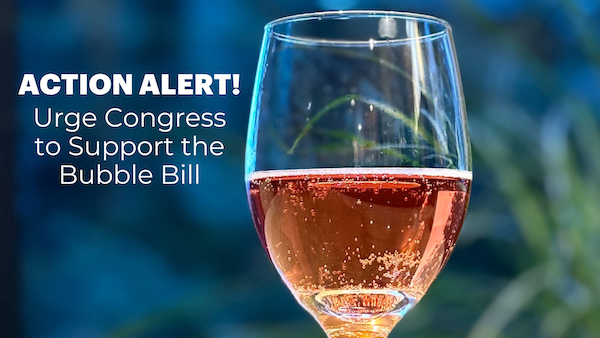
Earlier this year Representatives Earl Blumenauer (OR-D) & Mike Kelly (PA-R) introduced the Bubble Tax Modernization Act of 2024 (HR 7029) to the 118th Congress. Since then Representatives Suzanne Bonamici (OR-D), Andrea Salinas (OR-D), Lori Chavez-Deremer (OR-R), and Val Hoyle (OR-D) have signed on as co-sponors of the legislation. The “Bubble Bill” will amend a minor carbonation tax disparity for lower alcohol wine, cider and mead made with fruit. Read the complete bill here.
Despite the popularity of bubbly beverages, the carbonation tax–colloquially called the ‘bubble tax’ on fruit wine, fruit cider, and fruit mead makes carbonating these agricultural products at sparkling levels cost prohibitive. Most craft beverage entrepreneurs can’t afford to carbonate these products at the level the market wants. The result is that an important American agricultural sector is falling flat.
Current tax rates for low-ABV carbonated fruit wine, cider, and mead are $3.30 or $3.40 per gallon. Meanwhile low-ABV carbonated grape wines have a current tax rate of $1.07 per gallon. In addition, fruited beers, seltzers, hard kombucha, and ready-to-drink canned cocktails are carbonating freely to give consumers the bubbles they want.
Raising the floor of the carbonation tax threshold to include ALL low-ABV wine, cider, and mead to 0.64 grams of carbon dioxide per hundred milliliters will allow producers to compete more fairly in the evolving beverage market. The Craft Beverage Modernization and Tax Reform Act of 2020 achieved this for grape-only wines, but fruit-based craft beverages were overlooked. This created an excise tax disparity of $2.00 to $3.00 a gallon depending on the product. For more information download the Understanding Bubble Taxes explanatory document.
Allowing more carbonation will foster more economic opportunities for craft beverage makers, allow for more small producer collaborations, create increased opportunities for farms to stay viable with value-added products, and allow for diversification that could help farms and businesses mitigate disasters such as fires, droughts, floods, or crop disease.
Please ask your Congressional representatives to sign onto the Bubble Bill today to support American craft beverage producers and manufacturers.
Reps. Blumenauer & Kelly Introduce Bubble Bill
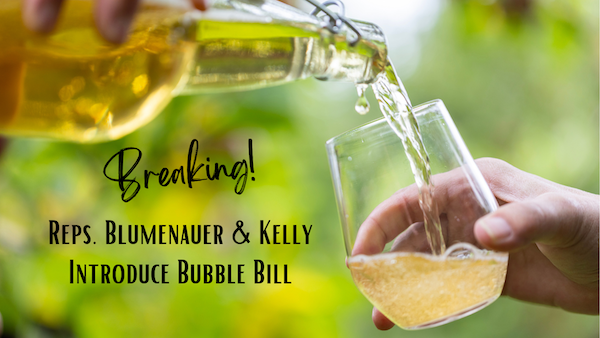
Representatives Blumenauer & Kelly Introduce the Bubble Tax Modernization Act
‘Bubble Bill’ Will Spur Innovation for Sparkling Co-fermented and Fruited Cider, Wine, and Mead
Washington, DC—Earlier today Representatives Earl Blumenauer (OR-D) & Mike Kelly (PA-R) introduced the Bubble Tax Modernization Act of 2024 (HR 7029) to the 118th Congress. The bill will amend a minor carbonation tax disparity for lower alcohol wine, cider and mead made with fruit.
Despite the popularity of bubbly beverages, the carbonation tax–colloquially called the ‘bubble tax’ on fruit wine, fruit cider, and fruit mead makes carbonating these agricultural products at sparkling levels cost prohibitive. Most craft beverage entrepreneurs can’t afford to carbonate these products at the level the market wants. The result is that an important American agricultural sector is falling flat.
“The cider industry is a quintessential American story. Pioneers taking what the land gives them and creating something magical. We must take every opportunity to support cidermakers, especially as the craft beverage industry recovers from the ravages of the pandemic. Right now, it is not a level playing field for cider, which is taxed more heavily than other carbonated, fruit-based beverages. My common-sense proposal will ensure cidermakers can create products for their customers, not the tax collector,” Rep. Blumenauer says.
Amie Fields, partner and sales manager at Botanist & Barrel Cidery & Winery in North Carolina, says the bill will enable innovation for their business.
“We are known for creativity and producing unique pet nats and bottle conditioned cider and wine with a range of ABVs, but recently we have been working on a series of lower alcohol content beverages. However, the carbonation tax currently disincentives our creativity, which hampers our ability to fully explore more sessionable beverages and boost our revenue by appealing to new customers,” explains Fields.
Current tax rates for low-ABV carbonated fruit wine, cider, and mead are $3.30 or $3.40 per gallon. Meanwhile low-ABV carbonated grape wines have a current tax rate of $1.07 per gallon. In addition, fruited beers, seltzers, hard kombucha, and ready-to-drink canned cocktails are carbonating freely to give consumers the bubbles they want.
Raising the floor of the carbonation tax threshold to include ALL low-ABV wine, cider, and mead to 0.64 grams of carbon dioxide per hundred milliliters will allow producers to compete more fairly in the evolving beverage market. The Craft Beverage Modernization and Tax Reform Act of 2020 achieved this for grape-only wines, but fruit-based craft beverages were overlooked. This created an excise tax disparity of $2.00 to $3.00 a gallon depending on the product.
Blumenauer’s legislation will address this disparity by changing how carbonation taxes are assessed. It will reduce a barrier for more innovative cider, fruit wine, and mead. In addition, it will create more economic opportunities for craft beverage makers, allow for small producer collaborations, create more opportunities for farms to stay viable with value-added products, and allow for diversification that could help farms and businesses mitigate disasters such as fires, droughts, floods, or disease.
HR 7029 is supported by the American Cider Association, the American Mead Makers Association, and Wine America.
###
The American Cider Association is an organization of cider and perry producers in the United States. Our mission is to grow a diverse and successful U.S. cider industry by providing valuable information, resources, and services to our members and by advocating on their behalf. You can learn more about them at www.ciderassociation.org.
Urge Congress to Support the USPS Shipping Equity Act
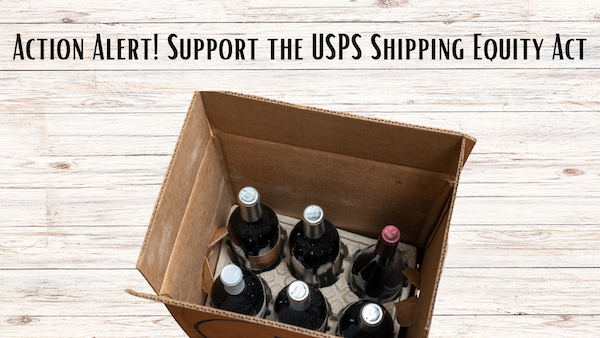
On May 23 Rep. Dan Newhouse (R-WA) once again introduced the USPS Shipping Equity Act in Congress alongside Rep. Jennifer Wexton (D-VA) and 8 other House co-sponsors. Currently, the U.S. Postal Service is not allowed to ship cider, beer, wine, or distilled spirits, because of a leftover, outdated ban put into effect during the Prohibition era. The USPS Shipping Equity Act would give parity to the US Postal Service, allowing it to ship licensed alcohol for commerce just like FedEex or UPS. Additionally, the USPS Shipping Equity Act gives rural producers access to another option for shipping alcoholic beverages. This bill is critical in leveling the playing field and increasing consumer and manufacturer choice while bringing in millions of dollars in revenue per year that will support small businesses, rural communities, agricultural enterprises and the US Postal Service.
We encourage you to email your Congressional representatives and urge them to cosponsor the USPS Shipping Equity Act. We have set up a campaign with an email template that you can use. Click the button below to be taken to the campaign. After you’ve emailed your reps, we encourage you to take a moment to share your actions on social media and via email to inspire others to reach out to their representatives as well.
Have questions? Please email ACA CEO Michelle McGrath.
ACA Comments on Competition
The Department of the Treasury issued a “Request for Information (RFI) to solicit input regarding the current market structure and conditions of competition in the American markets for …[alcohol producers], including an assessment of any threats to competition and barriers to new entrants.” This RFI was in response to an Executive Order (EO) by President Biden issued on July 9, 2021. The EO focuses broadly on consolidation, but a specific section on beverage alcohol was included in the EO. That section addressed patterns of consolidation and unnecessary trade practice regulations in “wine, beer and spirits markets…that impede market access for smaller and independent brewers, winemakers, and distilleries.” On August 18, 2021, the ACA submitted comments addressing a range of challenges our member cideries face in these areas including wholesaler consolidation, tied-house laws, packaging supply, standards of fill, carbonation taxes, geographic indicators, harvest dates and more. You can read our public comment letter here.
The American Cider Association voices the policy and regulatory needs of cideries in Washington D.C. One of our principal strategic goals is that common sense policies and regulations at the national level support the continued growth and sustainability of the US cider industry. As a big tent organization, we work hard to ensure that all of our members benefit from our advocacy. We are excited to see small producers especially highlighted by the EO. We celebrate this opportunity to address competition and trade practices in the beverage alcohol market and we thank our members for supporting this effort.
You can read all the submitted comments on the EO on the TTB’s comment docket.
For questions or comments, please contact our executive director, Michelle McGrath, at Michelle@ciderassociation.org. To support the ACA’s advocacy work, consider joining as a member today.
Restaurant Revitalization Fund Webinar Now Available!
The recording of the Restaurant Revitalizaiton Fund (RRF) Webinar with the U.S. Small Business Association that took place on April 21, 2021 is now available to American Cider Associations members.
For more information regarding the Restaurant Revitalization Fund, check out our blog post!
Restaurant Revitalization Fund Webinar Recording
This content is for members only.
If you were a member and are now seeing this message, please Renew your membership to continue.
Restaurant Revitalization Fund Update
UPDATE 04/27/2021 Registration for the Restaurant Revitalization Fund will begin will begin Friday at 9am and the application period will start on Monday, May 3 at 12pm ET. The online application will remain open to any eligible establishment until all funds are exhausted.
UPDATE 04/22/2021 SBA has announced technology partnerships with several point-of-sale (POS) service providers to help streamline the application process for the Restaurant Revitalization Fund (RRF). Partnerships have been established with Clover, NCR Corporation, Square, and Toast so far. Once SBA announces when applications will be accepted, qualifying businesses can work directly with these POS service providers to help them apply for RRF. The POS service providers will help in different ways, from providing an integrated application process, to supplying pre-packaged POS documentation, to hosting webinars. Check with your POS system to see what they are offering.
While SBA encourages applicants to use the POS ecosystem, applicants without access to point-of-sale service providers can submit their applications electronically at restaurants.sba.gov.
Who is eligible?
- Restaurant, Food Stand, Food Truck, Food Cart
- Snack and Nonalcoholic Beverage Bar
- Caterer
- Bar, Lounge, Saloon, Tavern
- An Inn*
- Brewery, Brewpub, Microbrewery, Taproom, Tasting room*
- Bakery*
- Winery*
- Distillery*
- A licensed facility or premise of a beverage alcohol producer where the public may taste, sample, or purchase products
- Other similar place of business in which the public or patrons assemble for the primary purpose of being served food or alcohol.
*Inns, bakeries, breweries, brewpubs, microbreweries, taprooms, tasting rooms, wineries, and distilleries are limited to those that have onsite sales to the public of 33% or more of gross sales.
What is the maximum grant amount for the RRFG?
The maximum grant amount is $5M per location and $10M total for the eligible businesses with more than one location.
Is a business that applied for and received a Paycheck Protection Program (PPP) loan eligible to apply for an RRFG?
Yes. However, the RRFG will be reduced by the total amount of PPP Loans.
What documents will an eligible business need to prepare to apply for a RRFG? (Please remember that while you can begin to compile information, you cannot yet submit your application to the SBA.)
- SBA Form 3172
- Verification for Tax Information: IRS Form 4506-T, completed and signed by Applicant. Completion of this form digitally on the SBA platform will satisfy this requirement.
- Gross Receipts Documentation: Any of the following documents demonstrating gross receipts and, if applicable, eligible expenses will satisfy this requirement.
- Business tax returns (IRS Form 1120 or IRS 1120-S)
- IRS Forms 1040 Schedule C; IRS Forms 1040 Schedule F
- For a partnership: partnership’s IRS Form 1065 (including K-1s)
- Bank statements
- Externally or internally prepared financial statements such as Income Statements or Profit and Loss Statements
- Point of sale report(s), including IRS Form 1099-K
- For applicants that are a brewpub, tasting room, taproom, brewery, winery, distillery, or bakery:
- Documents proving that onsite sales to the public comprise at least 33.00% of gross receipts for 2019, which may include Tax and Trade Bureau (TTB) Forms 5130.9 or TTB. For businesses who opened in 2020, the Applicant’s original business model should have contemplated at least 33.00% of gross receipts in onsite sales to the public.
What will the RRFG rollout schedule look like?
| Priority Period Days 1 to 21 | SBA will accept applications from all applicants but priority will be given to small businesses that have women, veterans, and socially or economically disadvantaged individuals that have 51% ownership. |
| Open to all Applicants Day 22 through funds exhaustion | SBA will accept applications from all eligible applicants and process applications in the order in which they are approved by SBA. |
Are some RRFG funds set aside for specific groups?
Yes, there are funds set aside for specific groups. They are as follows:
- $5 billion is set aside for applicants with 2019 gross receipts of not more than $500,000
- An additional $4 billion is set-aside for applicants with 2019 gross receipts from $500,001 to $1,500,000
- An additional $500 million is set-aside for applicants with 2019 gross receipts of not more than $50,000
What can my RRFG funds be used for?
- Business payroll costs (including sick leave)
- Payments on any business mortgage obligation
- Business rent payments (note: this does not include prepayment of rent)
- Business debt service (both principal and interest; note: this does not include any prepayment of principal or interest)
- Business utility payments
- Business maintenance expenses
- Construction of outdoor seating
- Business supplies (including protective equipment and cleaning materials)
- Business food and beverage expenses (including raw materials)
- Covered supplier costs
- Business operating expenses
For more information you can check out the RRFG Info Page at SBA or sign-up to receive updates about the RRFG from SBA. In addition, you can download the National Restaurant Association’s FAQ Guide for the Restaurant Revitalization Fund Grants

